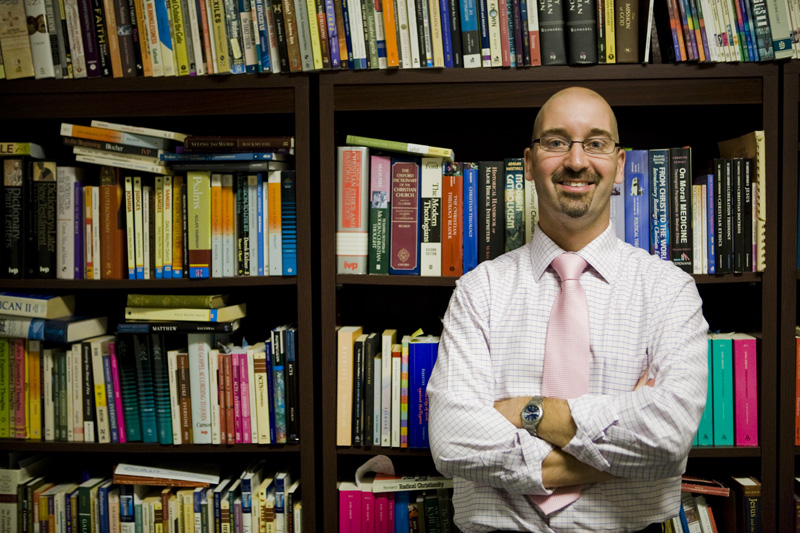Journeying to the United States this summer for the first time, professor Andy Draycott left his home in the United Kingdom to teach at Biola. Draycott was born in Oxford, UK and received his bachelor’s and master’s degrees from Oxford University.
Draycott teaches three sections of Theology II this semester and will teach the same in the spring with the addition of a new Bible in the Arts course, which He will teach with professor Jonathan Anderson of the art department.
Having studied politics, philosophy and Christian ethics at Oxford, he earned his master’s of literature in Bible and contemporary world from St. Andrew’s University and his doctorate in political theology from Aberdeen University, where he also taught for one year.
“As I was already studying secular philosophy, politics and ethics. I was already sensing there had to be more and there was more substantial grounds for it than was given in my syllabi,” Draycott said. “I had to turn to Christian ethics and Christian political thought. So it was really a matter of integrating what I knew in my heart the Bible must be teaching with a desire to learn how that had been understood by Christians through history.”
Draycott met his wife, Siân, while at Oxford. They were married in 1998 and now have a 2-year-old daughter named Jemima. Draycott also has as a twin brother, who is serving as a policeman in London.
“I think it’s a great way to grow up in that you’ve always got at least kind of one friend the same age to play with,” he said of his brother. They are not identical twins, and Draycott said they have noticeably different personalities.
After living in the UK, Draycott moved to Brazil with his parents when he was nine. Later, he moved to Portugal for four years to work in student campus ministry and train in cross-cultural ministry. To help with the teaching, both he and his wife learned to speak Portuguese.
“It was just a great time to do ministry together as a couple,” he said of his experience.
Draycott has also led several mission trips to Bulgaria and has been to Morocco and Hong Kong.
His hobbies include reading and cycling, which is part of the reason why he has yet to experience the havoc of California freeways.
“One thing I was told that I would not enjoy was the car culture. So the fact that I don’t ever really have to drive a car because I can cycle in at work from home means that what could have been the biggest culture shock has not really hit home,” Draycott said.
He is also pleased with the southern California weather.
“I love cycling in the sunshine and in the warmth,” Draycott said. “Certainly by this time of the year I’d be in multiple layers with my waterproof covers on the whole time.”
Over the years, Draycott has accumulated a collection of Charles Schulz’ “Peanuts” cartoons and his collection dates back to cartoons done in 1970. His other hobby is spending time with his family.
“At the moment, when I get home from work, I tend to take Jemima out on her scooter and she scoots up and down the sidewalks,” he said.
As for culture differences, the biggest change Draycott has noticed is the grading scale, but he said he likes the way the American system is set up. Among food differences, he noted that American chocolate tastes “different,” and that the British brand Cadbury still does not taste like the kind he is used to.
The UK also does not have private or Christian universities, a new and large aspect of life that Draycott is adjusting to as well.
“The whole kind of concept of what Biola is, is an alien one, so I’m really enjoying it,” he said. He added that it is refreshing to see non-Bible majors participating in Bible classes like theology.
Overall, his transition to the United States has been relatively easy. Draycott met Rob Pierce, another Biola professor, in the UK, so having friends here helped his family adjust more easily to a new country. He said that church culture has also helped him feel more at home.
“That makes a big difference when you move cultures,” he said. “The fact that you can just go to church and you’re immediately with brothers and sisters in Christ, I think helps a lot for that kind of settling period.”







